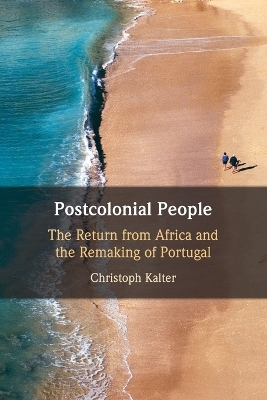
Postcolonial People
Cambridge University Press (Verlag)
978-1-108-93159-5 (ISBN)
Having built much of their wealth, power, and identities on imperial expansion, how did the Portuguese and, by extension, Europeans deal with the end of empire? Postcolonial People explores the processes and consequences of decolonization through the histories of over half a million Portuguese settlers who 'returned' following the 1974 Carnation Revolution from Angola, Mozambique, and other parts of Portugal's crumbling empire to their country of origin and citizenship, itself undergoing significant upheaval. Looking comprehensively at the returnees' history and memory for the first time, this book contributes to debates about colonial racism and its afterlives. It studies migration, 'refugeeness,' and integration to expose an apparent paradox: The end of empire and the return migrations it triggered belong to a global history of the twentieth century and are shaped by transnational dynamics. However, they have done nothing to dethrone the primacy of the nation-state. If anything, they have reinforced it.
Christoph Kalter is Professor of History at the University of Agder, where he specializes in the modern history of Western Europe in its global contexts. He is the author of The Discovery of the Third World: Decolonization and the Rise of the New Left in France, c. 1950-1976 (Cambridge University Press, 2016), first published as Die Entdeckung der Dritten Welt. Dekolonisierung und neue radikale Linke in Frankreich (Campus 2011). The book was awarded the Walter-Markov-Prize (2011) and the prize Geisteswissenschaften International (2012).
Introduction: Decolonization, migration, and the post-imperial nation; 1. Returnees or refugees? Defining the retornados; 1.1 Charting the retornados: Who came?; 1.2 Portuguese decolonization and the 'exodus' from the colonies; 1.3 Who can remain Portuguese? Citizenship and race in the legal definition of retornados; 1.4 Representing the returnees: On stigma, scapegoating, and refugeeness; 1.5 Helping the refugees: Emergency relief beyond the nation-state; 1.6 (Almost) No refugees under international law: The UNHCR in Portugal; 1.7 From actors' categories to analytical categories: A forced migration?; 2. Hotels for the homeless: Integrating the retornados; 2.1 A small miracle? The success story of integration; 2.2 Housing the returnees: The state as an integrator; 2.3 Unusual guests: Retornados in hotels and pensions; 2.4 Of camps and prisons: The centers of collective accommodation and the limits of integration; 2.5 No straightforward story: The retornados' integration revisited; 3. Making claims and taking action: Retornados as political actors; 3.1 Dangerous migrants? Collective action, government response, apolitical politics; 3.2 Fragmented forces, limited leverage: The retornado associations; 3.3 'Children of the Lusitanian fatherland': Non-white retornado activists; 3.4 'Incredibly real and shocking': The Far-Right Weekly, 'Jornal O Retornado'; 3.5 On representation: Retornados in parliament and the parties of the political right; 3.6 Retornado politics – and its rapid disappearance; 4. The return of the return: Memory and the retornados' reemergence; 4.1 A world after empire: Portugal and the current memory moment; 4.2 Authenticity, traumatic loss, successful integration: The retornados today; 4.3 Historicizing memory: Historical thinking and truth; Conclusion: The presence and the future of the past.
| Erscheinungsdatum | 17.10.2023 |
|---|---|
| Zusatzinfo | Worked examples or Exercises |
| Verlagsort | Cambridge |
| Sprache | englisch |
| Themenwelt | Geschichte ► Allgemeine Geschichte ► Neuzeit (bis 1918) |
| Geisteswissenschaften ► Geschichte ► Regional- / Ländergeschichte | |
| Geschichte ► Teilgebiete der Geschichte ► Wirtschaftsgeschichte | |
| ISBN-10 | 1-108-93159-6 / 1108931596 |
| ISBN-13 | 978-1-108-93159-5 / 9781108931595 |
| Zustand | Neuware |
| Haben Sie eine Frage zum Produkt? |
aus dem Bereich


